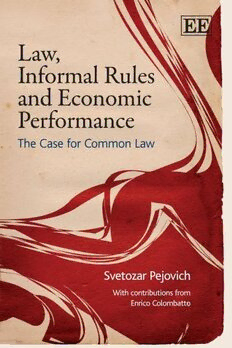
Law, Informal Rules and Economic Performance: The Case for Common Law PDF
190 Pages·2008·0.665 MB·English
Most books are stored in the elastic cloud where traffic is expensive. For this reason, we have a limit on daily download.
Preview Law, Informal Rules and Economic Performance: The Case for Common Law
Description:
`Professor Pejovich has ranged expertly across such seemingly disparate areas as legal systems, culture, economics and public choice theory to give us a thoroughly convincing roadmap for a nation's economic success. The rule of law, enforcement of private contracts, private property rights and an independent judiciary are the basic building blocks. But the common law system, as compared to the civil law system emanating from the European continent, also gets a lot of the credit. This is an erudite, yet happily readable work that takes a lot of the mystery out of differential economic performance among nations.' - Henry G. Manne, George Mason University School of Law, US `Written by one of the pioneers of modern property rights economics this book provides a most insightful, well readable and engaged discussion of the institutional foundations of the Western free enterprise system and the reason for its success, with a special emphasis on the differences between common law and civil law institutions. Readers will especially appreciate the many instructive examples and court cases that serve to illustrate the general argument.' - Viktor J. Vanberg, Universitaet Freiburg, Germany `This is a must-read for anyone who wants to understand why Western capitalism has outperformed all other economic systems. Professor Pejovich explains how the institutions of capitalism, especially those based on common law, make for excellence, even in comparison with Western civil law countries. He presents a compelling theory of how systems evolve through the interactions of formal and informal institutions, an analysis that has deep significance for economic reform proposals throughout the world.' - John H. Moore, Grove City College, US `There are many books on the virtues of capitalism and capitalism as a moral system. Steve Pejovich avoids that mistake. Capitalism, for him, is a system based on human behavior. It survives because it meets the needs that individuals face and provides opportunities that individuals are able to accept. Unlike the utopian visions that have competed against capitalism, it does not impose the vision of a self-selected group. It responds to the desires and wishes of real people most of whom find satisfaction in the way the system works for them. Pejovich traces the behavior of the system back to its roots in methodological individualism. In an excellent development he brings the philosophical into its relation to the economic.' - Allan Meltzer, Carnegie Mellon University, US `In Law, Informal Rules and Economic Performance, Svetozar Pejovich presents a unique juxtaposition of economics, political science, history and the theory of institutional change to explain the wealth of nations. The book is brilliantly convincing in arguing that individual rights rather than state control are responsible for the historical growth and prosperity of successful nations. Indeed, Pejovich goes further to argue that the only route to collective prosperity is through individual rights and freedom.' - Thomas Saving, Texas A&M University, US Capitalism has outperformed all other systems and maintained a positive growth rate since it began. Svetozar Pejovich makes the case within this book that a major reason for the success of capitalism lies in the efficiency-friendly incentives of its basic institutions, which continuously adjust the rules of the game to the requirements of economic progress. The analysis throughout is consistent and is supported by evidence. Key components of the proposed theory are the rule of law, the market for institutions, the interaction thesis, the carriers of change, and the process of changing formal and informal institutions. This book will be of great interest to academics and students of law and economics, new institutional economics, comparative systems and public choice throughout the world and especially in East Asia and South America where institutional issues are being debated.
See more
The list of books you might like
Most books are stored in the elastic cloud where traffic is expensive. For this reason, we have a limit on daily download.
